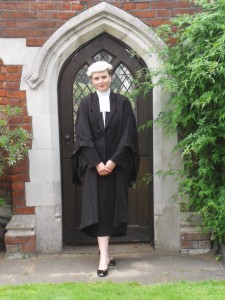Interview with Charlotte Proudman
1. You came to City for the BVC. You already had a 3-year undergraduate law degree. Why did you undertake further study between the City BVC [BPTC now] and pupillage?
I applied for pupillage while studying the BVC at City so I knew I would more than likely have a year between the BVC and commencing pupillage. Fortunately I gained pupillage just after the end of the BVC course by which time I had already applied to and been accepted by Cambridge University to undertake an M.Phil in Criminology. The Criminology Department at Cambridge University allows students to choose their own dissertation topic. I therefore chose ‘A Critical Examination of Arranged Marriage and Forced Marriage among Women in South Asian Communities in England and Wales – asking specifically whether the practices should be criminalized?’ – a subject which gained me a distinction, and a subject which is currently in the public eye following constant discussions regarding forced marriage within the Coalition government.
2. Your cv has a strong emphasis on human rights and family law. When did you first develop these interests?
I first volunteered for Oxfam when I was 16. At the age of 17 – between AS and A levels – I spent four months during the long summer holiday as a legal assistant at the Madurai High Court in India. Whilst in India I also got the opportunity to volunteer in an orphanage. These experiences were the triggers for my commitment to law as a future vocation. I soon realized that law could be used as an active tool to uphold the rights of vulnerable and marginalised individuals and consequently make a difference to people’s lives.
3. How did you find that legal assistant internship?
From the Internet, I literally googled international volunteering for 17 year olds. Most international volunteering organisations had a minimum 18 year old age limit but I found an organisation which allowed 17 year olds to volunteer abroad. I instantly applied and was accepted.
4. Since completing your undergraduate law degree you’ve done lots of pro-bono work. Could you tell us about two experiences which made a big impact both on you personally and on your pupillage success?
Give a helping hand with some pro bono. Image thanks to EJP Photo
Of course. The first would be the pro-bono work I did last year in the UK for the Iranian and Kurdish Women’s Rights Organisation. This involved campaigning against abuses of women’s rights, in particular forced marriages and honour killings. The highlight was working to overturn the deportation of Bita Ghaedi, an Iranian asylum seeker, who would have faced death for the ‘dishonour’ she had brought upon her family if she had been forced to return to her home country. The second was international experience, and I cannot stress how important international pro-bono work is for aspiring barristers. The pro-bono work again involved forced marriage, I researched the legal protections available in Pakistan courts for British women taken to Pakistan to be forced into a marriage. I undertook an internship in Lahore in 2010 with the Human Rights Commission of Pakistan and interviewed a number of consular staff at the British High Commission in Islamabad, following the internship I produced a report. Funding for the internship was generously provided by a Lincoln’s Inn scholarship and a Human Rights Lawyers Association Bursary.
My internship was publicised by City and received press coverage in New Law Journal, The Lawyer and Human Rights Today. My final report was published by Counsel Magazine, which is widely read in chambers. All of this had a huge impact on my securing pupillage.
5. So getting pupillage was a pretty painless process, then?
Absolutely not! It was one of the most challenging experiences of my life.
6. What tips can you give us about how to succeed with pupillage interviews?
Don’t book a holiday over the summer interview period for a start! Firstly, you need to gain pupillage interviews. To gain interviews it is imperative that your pupillage application ticks all the mandatory boxes: academic grades, advocacy experience, pro bono work, etc. Once you have ticked all the boxes, you will gain pupillage interviews and then you need to start preparing for one of the most nerve racking experiences of your life. To prepare for pupillage interviews I used cue cards for typical interview questions and, prepared bullet point answers. I cannot stress enough how important your answer is to the dreaded pupillage interview question – ‘why do you want to be barrister’ – I advise all pupillage interviewees to answer the question in a narrative form, tell your audience a story, which they will not forget, and as a result they will not forget you. Following this I did as much practice interviewing as possible: barristers, teachers, friends, family… I asked anyone and everyone to interview me! Make sure you are ready for questions about recent developments in the areas of law that you are interested in. However this alone is not enough you need to go the extra mile to bag the elusive pupillage. I advise all pupillage applicants to have a unique selling point, make sure you have done something that no other pupillage applicant has done, for example, rescuing child soldiers in Afghanistan or establishing your own charity – it’s not as grand or as hard work as it sounds, for instance your charity may aim to get underprivileged youngsters in the UK involved in ‘the law’ through lecturing on human rights abuses and civil liberties at schools, youth centers etc… Use your initiative and be creative.
7. Did you research the backgrounds of the admissions committee members?
Yes, once I had decided I wanted to practice in family law in London I then looked at barrister profiles on Chambers’ websites as an extra filter. I made a conscious decision not to apply to chambers where there was no match between my educational background (Keele University LL.B, 1% from a 1.1.) and that of the tenants. I knew that it was important to apply to 12 sets of Chambers where I stood a realistic chance of gaining pupillage.
8. You have a strong extra-curricular cv. Many law students puzzle about the right balance to strike between academic study and paralegal experience outside the classroom. What was your experience?
I think one should lean more towards academic achievement. In round terms, I’d say I split my time two thirds on academics and one third on extra-curricular. High grades are essential . However, your commitment to the profession will also be evaluated by what you’ve done outside university.
I’d say mini-pupillages, marshalling and pro-bono work. During my BVC year I was aiming to do 2-3 days pro-bono work a week. While at City I gained valuable experience working with the National Centre for Domestic Violence, drafting applicant affidavits for non-molestation, prohibitive steps and occupation orders, assisting the client during hearings and making submissions to the court. It was a fantastic introduction to advocacy and Chambers were pleasantly surprised by the amount of ‘real life’ experience I was gaining through NCDV, as I was essentially doing the same work as a second 6 month pupil would do. Finding the right pro-bono work means applying as early as possible and seeking a good match between your own interests and what is available. When it comes to pupillage, your application needs to stand out. In my case it was the international pro-bono work which caught the chambers’ eye. Working in Pakistan was a talking point in the majority of pupillage interviews, Chambers wanted to know what it was like working in Lahore amid Taliban tensions and terrorism and extreme flooding.
10. You’ve chosen to work in an area of the law which will be hard hit by the targeted reductions in Community Legal Service funding. How is this affecting your thinking?
It’s going to be tough. Reduced funding will definitely mean restricted access to justice for those who are most in need of legal services. The amount of legal aid available in the UK will put us below the EU average. Providing access to justice ‘cheaply’ rather than cost-effectively is a challenge, which everyone in the legal profession is currently facing. The traditional relationship of client to solicitor to barrister may be called into question if direct access is developed further. Realistically, I may find that I have to mix private and public work although both my own values and those of Coram Chambers where I’ll be undertaking pupillage emphasise the importance of public provision.
Charlotte Proudman undertook her Bar Vocational Course [now the BPTC] at the City Law School 2009/10. She followed this with an M.Phil in Criminology at Cambridge University. In July of this year she travelled to the Democratic Republic of Congo with Lawyers Without Borders at Cambridge to establish a free legal advice centre (Centre de Solidarite Nationale). The aim of Centre de Solidarite Nationale is to offer free advice to marginalised and vulnerable individuals to resolve their problems with gender based discrimination, health, finances, employment, housing, and many more issues. Charlotte’s role involved drafting legal contracts, forms, protocols and spreadsheets in order to collect reliable statistical data, whilst also training Centre De Solidarite Nationale volunteers on how to provide advice. Charlotte will be working in the House of Lords during September 2011, providing Baroness Cox, Baroness Howe and Baroness Scotland with Parliamentary research assistance, focusing primarily on the recent Arbitration and Mediation Services (Equality) Bill, which aims to prevent religious courts and councils in the UK from ruling on family law and criminal law matters. Charlotte starts pupillage at Coram Chambers, London on 3 October 2011.
Interview by Simon Taylor-Gill who completed the City GDL in 2011 after a career in teaching and business consulting spent mostly in France. His main areas of interests are commercial and EU law.


